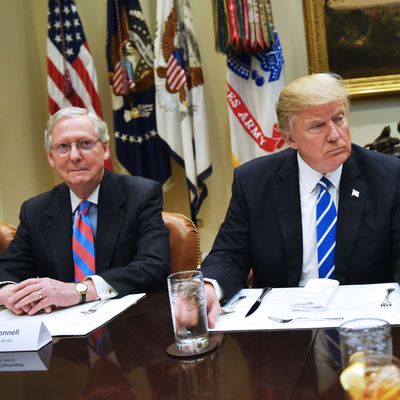
It is slowly, very slowly, dawning on the majority party that its plan to pass a comprehensive reform of the tax code with only Republican votes is doomed to fail. The problem, which the GOP may or may not currently realize, is that a bill can be tax reform, or it can be passed exclusively with Republican votes. But it can’t be both.
Tax reform means broadening the tax base — by taxing income that is currently untaxed, through deductions — and reducing the rates. Broadening the base is politically hard. Every current tax deduction has beneficiaries and defenders.
Tax reform can work politically, the classic example being the 1986 Tax Reform Act. But that law was created with bipartisan support. Bipartisanship is a crucial element. It meant that every member of Congress could potentially support the bill, which meant no member had walk-away power.
Mitch McConnell wants to pass his plan through the Senate with 50 Republican votes, because Democrats oppose any plan that creates a net tax cut for the rich, and cutting taxes for the rich is McConnell’s overriding policy goal. His strategy reduces the universe of possible votes to the 52 Republican senators. You can see the problem this creates: Just like with health care, three defections kill any bill.
Almost every Republican senator is going to have at least one current preference in the tax code they want to keep. Since McConnell needs the votes of almost all of them, he won’t be able to ignore any of their requests. Eliminating deductions with that political strategy is going to be virtually impossible.
There are signs the realization is slowly sinking in. When Republicans realize they can’t pass a partisan tax-reform bill, they will need to either pass a bill that’s tax reform and not partisan, or partisan but not tax reform. Politico reports the White House is reaching out to a handful of Senate Democrats, out of the calculation that squeezing 50 votes out of a universe of 52 will be too difficult.
In all likelihood, they will discover Senate Democrats don’t want to vote for a tax-reform bill that reduces taxes on the rich and raises them on the non-rich. That will lead them to the other alternative: the partisan bill that isn’t reform. Bloomberg News reports that Republicans are considering a bill that mixes permanent and temporary changes to the tax code. That would enable Republicans to pass tax cuts — which add to the deficit, and thus can’t be permanent under the Senate’s rules — without broadening the base to pay for them.
Republicans are eventually going to realize their path to passing a bill is a second Bush tax cuts. The main question is when they figure out that this is all they’re capable of doing.






























